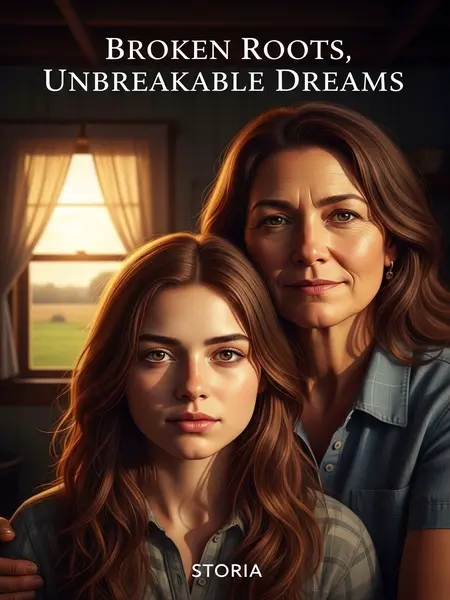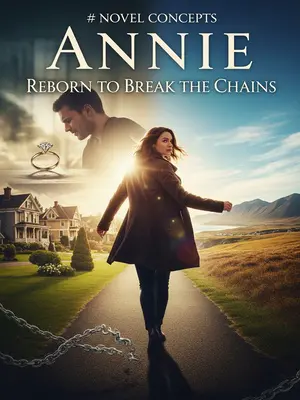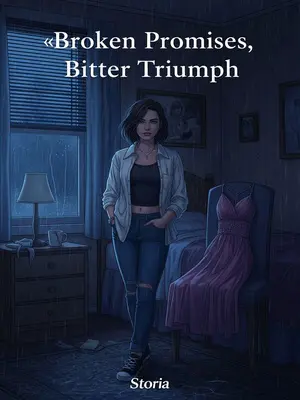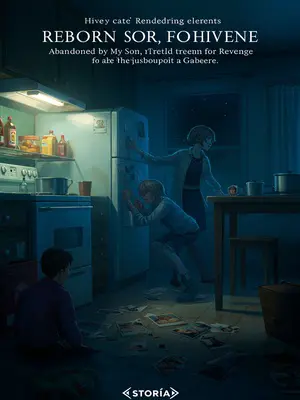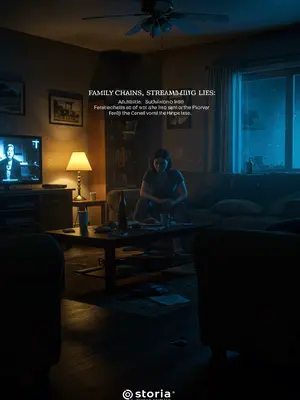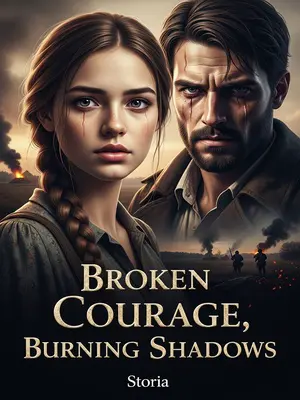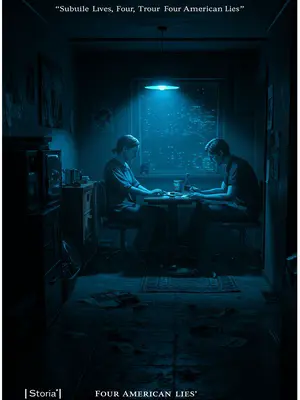Chapter 1: Winter's Orphan, Chosen Daughter
My name is Autumn Brooks—yeah, I know. After my birth parents had a baby boy, they left me behind.
I still remember that day like a half-faded photograph: the snow biting at my bare legs, my hands so numb I could barely clench them into fists. Sometimes, on cold mornings, I catch the scent of winter air and it all comes rushing back—I swear, that ache never fully leaves you.
My adoptive mom found me, asked my name, spat on the ground, and said, "Autumn? From now on, you’re Autumn Brooks."
She squinted at me like she didn’t buy it—then said it with the kind of grit only someone who's seen too much can muster, like she was daring the world to question her decision. Her voice was rough, but there was a flicker of something softer in her eyes, like she was already sizing me up as her own.
Truth be told, everyone in Maple Heights said my adoptive mom picked up a girl to marry off to my brother someday…
Gossip travels fast in small towns, especially in places where everyone’s business is everyone’s business. Folks in Maple Heights could be nosy and a little mean, always needing a story to chew on with their morning coffee—or over diner eggs, you know?
Mom said when she found me, it was the dead of winter. I was still wearing a t-shirt and shorts, with a pair of men’s flip-flops way too big for me. Me, a scarecrow.
She always shook her head when she told the story, as if she couldn’t believe it herself. “You looked like a scarecrow that had wandered off the porch,” she’d say, her voice half scolding, half trembling with anger at whoever let me freeze like that.
My whole body was frozen, my skin red and turning purple.
I remember shivering so hard my teeth rattled, the cold settling deep in my bones—no exaggeration. Even now, sometimes when the wind howls outside, I pull the covers up to my chin and remember how it felt to be that small and that cold.
I was barely breathing.
Call it luck, call it timing. They say kids are resilient, but I think I was just lucky. Lucky she found me before the night swallowed me up for good.
Mom had a sharp tongue. She looked at me, glanced around, and hollered, "Who in their right mind could do something this heartless—abandoning their own daughter! Damn right!"
She didn’t care who heard her. She wanted the whole neighborhood to know she thought it was a crime, and she was ready to fight the world over it. That was just Mom—loud, fierce, and absolutely unafraid.
And just like that, I went home with Mom.
No big speeches, no paperwork that day—just a strong hand grabbing mine, pulling me through the snow, and a promise I didn’t understand until much later: you’re not alone anymore. I held on.
That was the first time I saw my brother. He was lying on the bed, looking at me quietly.
The room smelled faintly of ointment and old blankets. He didn’t say a word, just watched me with these deep, serious eyes, like he was trying to decide what kind of person I’d turn out to be.
He just rolled over.
I stood there, awkward and unsure, my breath fogging in the cold air. He didn’t say anything—fair enough—just turned his back, but it was a kind of welcome in its own way.
"Call him your brother. What’re you waiting for?" Mom nudged me.
She gave me a gentle push forward, her tone half command, half encouragement, as if saying the word would make it real.
"Brother," I said, standing there, terrified.
The word felt strange on my tongue. I was scared he wouldn’t like me. I was scared he’d ask Mom to send me away.
I was terrified he wouldn’t accept me. I worried he’d want Mom to send me back.
Every muscle in my body was tense, waiting for him to say something—anything—that would seal my fate. I felt like I was holding my breath, waiting for the verdict.
Luckily, he didn’t say anything, neither for nor against.
His silence was a kind of mercy. I’ll take it. I took it as a sign that I could stay, at least for now. Sometimes silence is the kindest answer you can get.
So I stayed at Mom’s house.
That night, I lay awake listening to the creak of the old house, the wind rattling the windows—and for the first time in a long time—I let myself hope I’d found a place to belong.
But the very next day, rumors started swirling around Maple Heights.
Small towns have long memories and quick tongues. By breakfast, the story had already made its rounds—by lunch, it was gospel. And that was that.
"Emma Brooks picked up a girl to marry off to her 'crippled' son." (Ugly word, I know.)
The word “crippled” stung every time I heard it. Even at that age, I knew how cruel people could be with just a few careless words.
"Yeah, her boy’s leg is shot, he’ll never find a wife. If I were her, I’d be worried too."
The grown-ups whispered over their fences, making sure I could hear. They didn’t care that I was a kid—small town folks never really hide their opinions.
Mom grabbed a broom and stormed out onto the front stoop.
She wasn’t afraid to go to war for her family. She marched out onto the porch steps, broom in hand, ready to swing at anyone who crossed her. Message received.
"If anyone dares to gossip again, I’ll come for you myself. You think I’m joking? Try me! Over my dead body!"
Her voice echoed down the street. You could hear a pin drop after that. Mom’s temper was legendary, and nobody wanted to be on the receiving end.
After that, no one in town ever said I was my brother’s future bride again.
The rumors died down in public, but I knew the whispers never really stopped. Still, Mom had drawn a line in the sand, and for a while, that was enough.
When Mom wasn’t around, I still heard plenty of whispers, but it didn’t really bother me.
I learned to let it roll off my back. You get used to being the subject of other people’s stories after a while.
Later, Mom took me to the county social services office to get my paperwork straight, and my name changed from Autumn Hayes to Autumn Brooks.
We waited in a stuffy room that smelled like old coffee and floor wax. I remember the way Mom filled out the forms, her handwriting neat but forceful, like she was making sure the world knew I belonged to her.
Mom said, "Brooks sounds better than Hayes."
She said it with a kind of finality, like she was erasing the past and starting fresh. Brooks—got a ring to it. I liked the way it sounded—solid, American, like a river running through the land.
Mom was always busy during the day, tending to our little patch of land all by herself.
She’d be up before sunrise, her boots crunching on the frosty grass, the screen door slamming behind her. Sometimes I’d watch her from the window, her figure small but unbreakable against the endless sky.
She’d head out at six or seven in the morning and not come home until eight or nine at night.
I used to watch the sun set behind the trees, counting the hours until I’d see her headlights bounce up the driveway. Even exhausted, she always checked in on us first thing.
So all three meals at home were left to me.
I learned early how to crack eggs without breaking the yolks, how to toast bread just right, and how to stretch a can of Bush’s beans into a meal. I made mistakes, but nobody starved.
Back then, I wasn’t even as tall as the kitchen counter, and when I cooked, I had to stand on a stool.
I’d wobble on that old wooden stool, reaching for pots and pans that felt giant in my small hands. My legs would ache, but I was proud every time I managed to make something edible.
That year, my brother was sixteen. I heard Mom mention that when he was little, he was a daredevil, climbed a tree, and accidentally fell.
The way Mom told it, he was always wild—climbing anything he could, chasing after stray dogs, fearless. The fall changed everything. You could see the sadness flicker in her eyes when she talked about it.
The family was poor and couldn’t get him treated in time, so my brother’s legs were left permanently injured.
It was the kind of misfortune that could break a family, but Mom just got tougher. She never let anyone pity her or my brother. She just kept going.
Not long after, Mom wanted to send me to elementary school.
She said it like it was the most natural thing in the world, but I could tell it meant a lot to her. Education was her way of fighting back against everything life had taken from her.
Neighbors started gossiping again.
The same old voices, just with new material. I’d hear them clucking like hens on the porch, their words sharp as thorns.
"Emma, it’s one thing to take her in, but why send her to school? Look at the girls in this part of town—none of them go to college."
Their tone was always a mix of judgment and disbelief, as if Mom was breaking some unspoken rule. (Of course, school was required, but some folks just liked to pretend otherwise.)
"Exactly! If she were your own, that’d be different. Why let a foundling study? What’s the point?"
They never saw me as anything but the outsider, the stray. Their words stung, but Mom never let them win.
